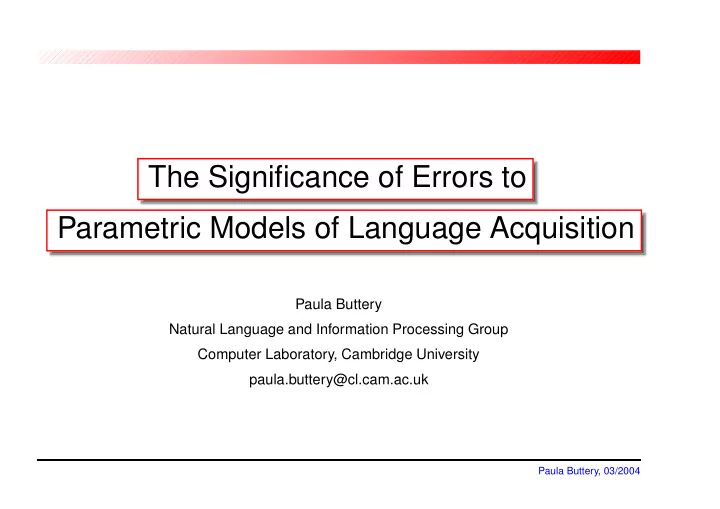

The Significance of Errors to Parametric Models of Language Acquisition Paula Buttery Natural Language and Information Processing Group Computer Laboratory, Cambridge University paula.buttery@cl.cam.ac.uk Paula Buttery, 03/2004
Classification of Language Examples Children become fluent despite lack of formal language teaching. Not every utterance heard is a valid example of the environment language. How can the child know which utterances are valid? Every time a child mis-classifies an utterance as valid we get an error. Paula Buttery, 03/2004
Sources of Error ➽ Accidental Errors: lapses of concentration, slips-of-the-tongue, interruptions. ➽ Ambiguous Environments: bi-lingual environments, diglossia, language change ➽ Indeterminacy of Language: ➼ Indeterminacy of meaning: “John kissed Kate” vs. “Kate was kissed by John” ➼ Indeterminacy of parameter settings: SVO vs. SOV with v2 Require a learning model to attempt to learn from every utterance and be unaffected by misclassification errors. Paula Buttery, 03/2004
The Numbers Game Game with 2 players: ➽ Player One: thinks of a set of numbers that can be defined by a rule. ➽ Player Two: attempts to discover the rule defining the set. Only information available to player two is a stream of examples from player one. Paula Buttery, 03/2004
Deterministic Learners Gibson and Wexler’s Trigger Learner: ➽ Algorithm: ➼ attempt to parse with current parameters; ➼ change one parameter; ➼ adopt new settings if we can analyze an utterance that was previously not analyzable. ➽ Problems: ➼ local maxima; ➼ worse case scenario - last utterance seen is an error. Gibson E and Wexler K, 1994. Triggers. Linguistic Inquiry 25(3): 407-454 Paula Buttery, 03/2004
A Robust Learning System audio signal observations SPEECH PERCEPTION SYSTEM CONCEPTUAL SYSTEM word symbols semantic hypotheses SEMANTIC MODULE SYNTACTIC MODULE WORD ORDER PARAMETER MODULE UNIVERSAL GRAMMAR MODULE LEXICON CATEGORY PARAMETER MODULE Paula Buttery, 03/2004
Semantics Learning Module Cross Situational Techniques: ➽ Constraining Hypotheses with Partial Knowledge: If learner knows that: “cheese” �→ cheese and on hearing “Mice like cheese” hypotheses: like(mice, cheese) madeOf(moon, cheese) madeOf(moon, cake) then we can rule out madeOf(moon, cake) Siskind J. 1996. A computational study of cross situational techniques for learning word-to-meaning mappings. Cognition 61(1-2):39-91 Paula Buttery, 03/2004
Syntactic Learning Module Hypothesizes categorial grammar categories for a word: ➽ Forward Application ( > ) X/Y Y → X ➽ Backward Application ( < ) Y X \ Y → X likes Sandy Kim ( s \ np ) /np np > np s \ np < s Paula Buttery, 03/2004
Syntactic Learning Module Typing Assumption: the semantic arity of a word is usually the same as its number of syntactic arguments. verb(arg1 ,arg2) �→ a | b | c x �→ y � ❅ � ❅ � ❅ � ❅ n y | z n y \ n Paula Buttery, 03/2004
The Universal Grammar Underspecified inheritance hierarchy: ➽ Categorial Parameters: 60 parameters ➼ one per legal syntactic category ➽ Word Order Parameters: 18 parameters ➼ e.g. subject direction parameter (SVO,SOV vs. OVS,VSO) Universal Grammar module consulted whenever syntactic learner returns a valid syntactic category for every word. Paula Buttery, 03/2004
The Sachs Corpus Natural interactions of a child with her parents: ➽ Real child-directed utterances - child’s utterances removed; ➽ Corpus modeled by Villavicencio; ➽ Annotated with semantic representations. Villavicencio A. 2002. The acquisition of a unification based generalized categorial grammar Ph.D Thesis, University of Cambridge. Paula Buttery, 03/2004
Exp. 1: Indeterminacy of Meaning Increasing numbers of semantic hypotheses per utterance: ➽ Extra hypotheses chosen randomly. ➽ Correct semantic expression was always present in the set. ➽ Hypothesis sets of sizes 2, 3, 5, 10 and 20. Paula Buttery, 03/2004
Exp. 1: Indeterminacy of Meaning 82 81 80 F1 79 78 77 0 5 10 15 20 Number of Hypotheses per Set Paula Buttery, 03/2004
Exp. 2: Indeterminacy of Parameter Settings Misclassification due to thematic role: “He likes fish” Possible interpretations: likes(he, fish) - SVO likes(fish, he) - OVS ➽ Learner was exposed to increasing amounts of misinterpreted thematic role (0% to 50% of all occurances) Paula Buttery, 03/2004
Exp. 2: Indeterminacy of Parameter Settings ➽ mis-classification varied between 0% and 50% at 10% intervals: ➼ 9 word-order-parameters set; ➼ 13.5 word-order-parameters correct according to target (due to inheritance). ➼ 45% difference in speed of convergence between error-free and maximum thematic-role-error case. Paula Buttery, 03/2004
Conclusions Errors due to misclassification of language examples are likely. Deterministic parametric learners have problems handling errors. A statistical error-handling learner may be robust to errors. Indeterminacy of language is just another case of misclassification. Natural Language and Information Processing Group: www.cl.cam.ac.uk/users/ejb/ email to: paula.buttery@cl.cam.ac.uk. Paula Buttery, 03/2004
Recommend
More recommend